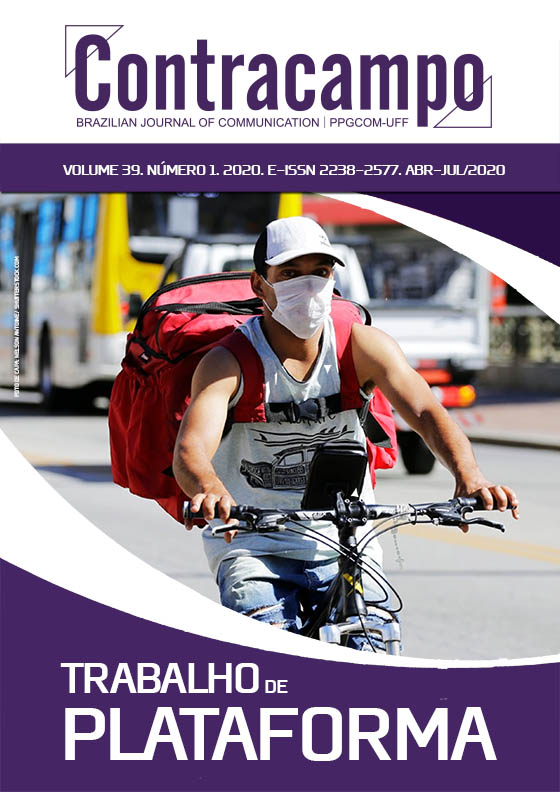The Brazilian Workers in Amazon Mechanical Turk: Dreams and realities of ghost workers
DOI :
https://doi.org/10.22409/contracampo.v39i1.38252Mots-clés :
digital labor, Amazon Mechanical Turk, Global South, platform, digital capitalismRésumé
Contributing to research on digital platform labor in the Global South, this research surveyed 149 Brazilian workers in the Amazon Mechanical Turk (AMT) platform. We begin by offering a demographic overview of the Brazilian turkers and their relation with work in general. In line with previous studies of turkers in the USA and India, AMT offers poor working conditions for Brazilian turkers. Other findings we discuss include: how a large amount of the respondents affirmed they have been formally unemployed for a long period of time; the relative importance of the pay they receive to their financial subsistence; and how Brazilian turkers cannot receive their pay directly into their bank accounts due to Amazon restrictions, making them resort to creative circumventions of the system. Importantly, these “ghost workers” (Gray & Suri, 2019) find ways to support each other and self-organize through the WhatsApp group, where they also mobilize to fight for changes on the platform. As this type of work is still in formation in Brazil, and potentially will grow in the coming years, we argue this is a matter of concern.Téléchargements
Références
AMT. FAQs. Disponível em: <https://www.mturk.com/worker/help>. Acesso em: 2019a
AMT. Overview of mechanical turk. Disponível em: <https://docs.aws.amazon.com/AWSMechTurk/latest/RequesterUI/OverviewofMturk.html>. Acesso em: 2019b
ANTUNES, R. (ed.). Riqueza E Miséria Do Trabalho No Brasil Iv. São Paulo: Boitempo, 2019
AYTES, A. “Return of the crowds: Mechanical turk and neoliberal states of exception”. In: Scholz, T. Digital labor: The internet as playground and factory. NY: Routledge, 2012
BERINSKY, A. J.; HUBER, G. A. et al. “Evaluating online labor markets for experimental research: Amazon.com’s mechanical turk”. Political Analysis, v. 20, n. 3, p. 351-368, 2012
BROUSSARD, M. Artificial Unintelligence: How Computers Misunderstand the World. Cambridge: MIT Press, 2019
BUOLAMWINI, J.; GEBRU, T. “Gender Shades: Intersectional Accuracy Disparities in Commercial Gender Classification”. 81, 2018, Anais. 2018
CRARY, J. 24/7: Late Capitalism and the Ends of Sleep. Verso Books, 2013
CRAWFORD, K.; JOLER, V. Anatomy of an AI System. Disponível em: . Acesso em: 2018
DAVIS, A. A Liberdade é uma luta constante. São Paulo: Boitempo, 2018.
DIFALLAH, D.; FILATOVA, E. et al. “Demographics and Dynamics of Mechanical Turk Workers”. In: Proceedings of the Eleventh ACM International Conference on Web Search and Data Mining - WSDM ‘18, x, 2018. Anais. NY, New York, USA: ACM Press, 2018
EL MAARRY, K.; MILLAND, K. et al. “A Fair Share of the Work”. In: Proceedings of the 10th ACM Conference on Web Science - WebSci ‘18, x, 2018. Anais. NY, USA: ACM Press, 2018
EL MAARRY, K.; MILLAND, K. et al. “A Fair Share of the Work”. In: Proceedings of the 10th ACM Conference on Web Science - WebSci ‘18, x, 2018. Anais. NY, USA: ACM Press, 2018
FINN, E. What Algorithms Want. Cambridge: MIT Press, 2017
GERSHGORN, 2017. The data that transformed AI research—and possibly the world. Disponível em: <https://qz.com/1034972/the-data-that-changed-the-direction-of-ai-research-and-possibly-the-world/>. Acesso em: 2019.
GILLESPIE, T. “The politics of ‘platforms’”. New Media & Society, v. 12, n. 3, p. 347-364, 2010
GRAY, M. L.; SURI, S. Ghost Work: How to Stop Silicon Valley From Building a New Global Underclass. Boston: Houghton Mifflin Harcourt, 2019
GROHMANN, R. “Materialidades do trabalho digital no sul global e invisibilidades comunicacionais”. Comunicação & Educação, v. 23, n. 2, p. 153-163, 2018
HARA, K.; ADAMS, A. et al. “Worker Demographics and Earnings on Amazon Mechanical Turk: An Exploratory Analysis”. x, 2019, Anais. ACM, 2019
IBGE. Censo 2010. Disponível em: <https://censo2010.ibge.gov.br/noticias-censo?id=3&idnoticia=2170&view=noticia>. Acesso em: 2010
IBGE. Conheça o Brasil: Cor ou Raça. Disponível em: <https://censo2010.ibge.gov.br/noticias-censo?id=3&idnoticia=2170&view=noticia>. Acesso em: 2015
IBGE. PNAD Contínua: Desemprego cai para 11,8% com informalidade atingindo maior nível da série histórica. Disponível em: <https://agenciadenoticias.ibge.gov.br/agencia-noticias/2012-agencia-de-noticias/noticias/25534-desemprego-cai-para-11-8-com-informalidade-atingindo-maior-nivel-da-serie-historica>. Acesso em: 2019
IPEIROTIS, P. G. “Demographics of mechanical turk”. NYU Working Paper No. CEDER-10-01, v. n. p. 2010
IRANI, L. C.; SILBERMAN, M. S. “Turkopticon”. In: Proceedings of the SIGCHI Conference on Human Factors in Computing Systems - CHI ‘13, x, 2013. Anais. NY, USA: ACM Press, 2013
IRANI, L. White House / NYU AINow Summit Talk: “The Labor That Makes AI Magic”. Disponível em: <https://quote.ucsd.edu/lirani/white-house-nyu-ainow-summit-talk-the-labor-that-makes-ai-magic/>. Acesso em: 2016
MARX, K. Manuscritos ecônomicos-filosóficos. São Paulo: Boitempo, 2010
OLIVEIRA, C.; SALOMÃO, K. Os números secretos da uber: US$ 1 bi no brasil, US$ 11 bi no mundo. Exame. Disponível em: <https://exame.abril.com.br/negocios/os-numeros-secretos-da-uber-us-1-bi-no-brasil-us-11-bi-no-mundo/>. Acesso em: 2019
ONG, A. Neoliberalism as Exception. Durham: Duke University Press, 2006
RIESEWIECK, M.; BLOCK, H. “The Cleaners”. 2018
ROBERTS, S. T. Behind the Screen. New Haven: Yale University Press, 2019
ROSS, J.; IRANI, L. et al. “Who Are the Crowdworkers”. In: Proceedings of the 28th of the international conference extended abstracts on Human factors in computing systems - CHI EA ‘10, x, 2010, USA. Anais. NY, New York, USA: ACM Press, 2010
ROY, D. F. “Banana Time” Job satisfaction and informal interaction”. Human Organization, v. 18, n. 4, p. 158-168, 1959
SILBERMAN, M.; IRANI, L. et al. “Ethics and tactics of professional crowdwork”. XRDS: Crossroads, The ACM Magazine for Students, v. 17, n. 2, p. 39-43, 2010
SILVA, T. “Teoria Racial Crítica E Comunicação Digital: Conexões Contra a Dupla Opacidade”. In: 42º Congresso Brasileiro de Ciências da Comunicação, 2019, Belém. Anais. Belém: 2019
SRNICEK, N. Platform Capitalism. Cambridge: Polity, 2017
WOODCOCK, J.; GRAHAM, M. The Gig Economy: A Critical Introduction. Cambridge: Polity, 2019
YIN, M.; GRAY, M. L. et al. “The Communication Network Within the Crowd”. In: Proceedings of the 25th International Conference on World Wide Web - WWW ‘16, x, 2016. Anais. NY, USA: ACM Press, 2016
ZYSKOWSKI, K.; MILLAND, K. “A crowded future: Working against abstraction on turker nation”. Catalyst: Feminism, Theory, Technoscience, v. 4, n. 2, p. 1-30, 2018
Téléchargements
Publié
Numéro
Rubrique
Licence
Os autores retêm os direitos autorais e concedem à revista o direito de publicar o seu trabalho pela primeira vez sob a licença Creative Commons (CC-BY), que permite o intercâmbio de obras e reconhecimento de autoria na revista.


